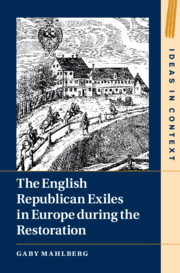
- Cited by 8
-
Cited byCrossref Citations
This Book has been cited by the following publications. This list is generated based on data provided by Crossref.
HONE, JOSEPH 2021. JOHN DARBY AND THE WHIG CANON. The Historical Journal, Vol. 64, Issue. 5, p. 1257.
Mahlberg, Gaby 2022. Reading and translating Algernon Sidney’sDiscoursesin early modern Germany. History of European Ideas, Vol. 48, Issue. 6, p. 713.
Ashby, Thomas 2023. Republicanism and Democracy. p. 81.
Ashby, Thomas 2024. English Republicanism in Exile, European Contexts, and Global Possibilities. Global Intellectual History, p. 1.
Lista, Giovanni 2024. ‘A person of greater calmness, but less caution’: Andrew Fletcher of Saltoun’s republican militia (1697–1703). History of European Ideas, p. 1.
Ducrocq, Myriam-Isabelle 2024. Faut-il se souvenir du républicanisme anglais ? L’héritage intellectuel du républicanisme anglais dans le temps long. XVII-XVIII, Vol. 81, Issue. ,
Von Eggers, Nicolai 2024. Joel Barlow in Denmark: American Republicanism and the Republic of Translations in Continental Europe in the Revolutionary 1790s. Global Intellectual History, p. 1.
Gheeraert-Graffeuille, Claire 2024. The “grave of oblivion”: Remembering the English Civil War in Sir Thomas Fairfax’s Short Memorials (1699). XVII-XVIII, Vol. 81, Issue. ,
- Publisher:
- Cambridge University Press
- Online publication date:
- September 2020
- Print publication year:
- 2020
- Online ISBN:
- 9781108894463


